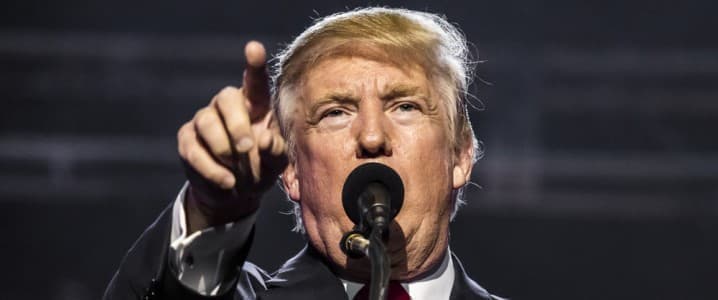Simon Watkins
Nov 03, 2025

 oilprice.com
oilprice.com
Nov 03, 2025
- President Trump's hardline approach, featuring tariffs and sanctions, has been deemed effective following his meeting with Chinese President Xi Jinping, particularly in securing the suspension of China's rare-earth export ban.
- This tougher strategy contrasts with his first term's more cooperative approach, which was criticized for prioritizing trade over security considerations, as evidenced by the reversal of sanctions on ZTE.
- The U.S. is increasingly using parallel sanctions on China's energy imports from Iran and Russia to exert pressure, a strategy that is likely to continue in ongoing disputes between the two countries.
A key lesson was learned by U.S. President Donald Trump following his landmark meeting on 30 October with Chinese counterpart Xi Jinping: that the hardline approach he has adopted in his second term in the top job, characterised by quickly-implemented tariffs and sanctions, has worked well and he should stick with it. In broad terms, Trump rated the one hour and 40 minute get together on the sidelines of the APEC summit in South Korea’s Busan as a ‘12’ on a scale of one to 10, with “an outstanding group of decisions made”. Xi seemed much keener to emphasise that he did not want both sides “falling into a vicious cycle of mutual retaliation”, and that they should focus on “the benefits of cooperation”. However, the fact that Trump was able to pressure Xi into suspending China’s ban on rare-earth exports announced on 9 October – the key issue that the U.S. wanted addressed urgently – underlines to many how effective his new tougher strategy has been than the more co-operative one he pursued in his first presidential term.
In his dealings with Xi during this period, he was often accused of “[giving up] security considerations for trade”, as Trump’s former National Security Adviser, John Bolton, put it in his book. An early case in point cited was the reversal of hard-hitting U.S. sanctions imposed on Chinese telecommunications company ZTE for repeated violations of the U.S. sanctions on Iran and North Korea. According to Bolton, after a private telephone call to Xi – in which it transpired that China’s leader told Trump that he would “owe him [Trump] a favour” if he reduced the sanctions against ZTE – Trump did exactly what Xi had asked for. Shortly after this, Trump tweeted: “President Xi of China and I are working together to give massive Chinese phone company, ZTE, a way to get back into business, fast. Too many jobs in China lost. Commerce Department has been instructed to get it done!” As Bolton put it in the book: “Since when had we started to worry about jobs in China?”
That said, sources close to that first administration exclusively indicated to OilPrice.com at the time and since that this approach arose more from the relative political naivety of that administration than from anything more sinister. More specifically, Trump had carried over into his presidency the New York real estate way of negotiating with rivals, according one such Washington-based source. Given that this approach did not work as effectively as he had hoped, it has changed in his second term, with the flipside to the wheeler-dealer style being a hard-edged non-nonsense approach. This was evidenced recently with the U.S.’s military support for Israeli strikes against Iran’s nuclear programme targets after Trump’s 60-day deadline to Iran to reach a new nuclear agreement expired. Before that, President-Elect Trump was key to pushing for the removal of Bashar al-Assad from Syria in December – a regime that had been a particular irritant to him in his first term. “He also did this to put Moscow’s, Beijing’s and Tehran’s leadership on notice that Washington can easily redraw and restructure borders and regimes in not just the Middle East but also in Eastern Europe and elsewhere, if it wants to,” a senior source connected to the European Union’s (E.U.) security complex exclusively told OilPrice.com at the time.
Similarly in contrast to the softer approach Trump took to China’s Xi in his first term, this second time around Beijing was hit with the highest tariffs anywhere in the first round of such U.S. sanctions in April. Moreover, having negotiated reductions down on both sides, Trump then reimposed these extremely heavy tariffs again following China’s tightening of export controls on rare earth metals in October. As Beijing had additionally barred these rare earth exports for foreign military use, which directly affected U.S. defence supply chains, the timing looked to Trump like a geopolitical test of his presidency personally by counterpart Xi, according to a senior Washington-based legal source recently spoken to by OilPrice.com. It was for this reason that Trump ordered sweeping 100% tariffs on all Chinese imports starting 1 November, with a separate 130% tariff on select categories, aimed at high-tech and industrial goods. The same day as China’s tightening of export controls on rare earth metals, the U.S. Treasury Department also sanctioned China’s Rizhao Shihua Crude Oil Terminal at Lanshan port and Shandong Jincheng Petrochemical Group (an independent refinery in Shandong province), that have handled millions of barrels of Iranian petroleum.
Using parallel sanctions measures with a direct effect on China’s energy imports – a crucial weak link in its superpower status – is a mechanism that Beijing is likely to see more often from the U.S. as part of ongoing disputes between the two countries, according to the E.U. and Washington sources. “China is reliant on oil and gas imports to fuel its economic growth, as it has insufficient natural resources itself to do so, and this includes cut-price imports from Iran and Russia,” said the E.U. source last week. “So, sanctioning these imports kills two birds with one stone: it threatens China’s economy, and it undermines the ability of two rogue states to keep doing what they’re doing – in Iran’s case, funding global terrorism, and in Russia’s financing the war in Ukraine,” he added. “This is why Washington sees sanctions imposed on China for Iranian oil imports as serving the same purpose as sanctions imposed on it [China] for Russian oil imports,” he underlined.
Indeed, the U.S.’s language regarding the energy relationship between Iran, Russia, and China – and the broader implications it has – remains unequivocal. U.S. Treasury Secretary Scott Bessent said recently that: “The Treasury Department is degrading Iran’s cash flow by dismantling key elements of Iran’s energy export machine.” He added that entities who facilitate such trade in whatever country they are located have: “Collectively enabled the export of billions of dollars’ worth of petroleum and petroleum products, providing critical revenue to the Iranian regime.” Under Secretary of the Treasury for Terrorism and Financial Intelligence Brian E. Nelson said of the recent sanctions on Chinese oil entities that: “The Iranian regime continues to fuel conflict in the Middle East to fund its destabilizing activities, [and] Today, the United States is taking action to stem the flow of revenue that the regime uses to support terrorism abroad, as well as to oppress its own people.”
Similarly on Russia, the U.S. has already warned China that ongoing imports of its oil could lead to huge tariffs being imposed, according to the E.U. source. “During the talks [end-July U.S.-China trade talks in Stockholm], [U.S. Treasury Secretary Scott] Bessent told his opposite number [Vice Premier He Lifeng] that legislation [‘Sanctioning Russia Act of 2025’] is being drawn up in Congress authorising the imposition of up to 500% tariffs on countries that buy sanctioned Russian oil,” he exclusively told OilPrice.com. In reality, the Act goes wider to encompass any country that “knowingly sells, supplies, transfers, or purchases oil, uranium, petroleum products, or petrochemical products that originated in the Russian Federation”. It currently has 84 listed co-sponsors in the U.S. Senate alone, according to the U.S. Congress website, and the Speaker of the House has also indicated his chamber’s support to pass the bill.
Trump also succeeded very recently in pressuring the E.U. into placing sanctions on one of China’s key oil and gas players -- the China National Petroleum Corporation – for importing Russian crude oil through the Eastern Siberia–Pacific Ocean oil pipeline. This is to be part of a wider move for the Union of 27 European countries – and one of China’s biggest trading partners – to bring sanctions to bear on Beijing as and when required. Indeed, the President of the Ursula von der Leyen E.U.’s governing body – the European Commission -- Ursula von der Leyen recently stated in the accompanying press conference to the 19th Sanctions Package on Russia announcement that: “We target refineries, oil traders, petrochemical companies in third countries, including China.” At the same time, E.U. foreign policy head Kaja Kallas, posted on social media that: “We’re adding more chemicals, metal , salts, and ores to our export bans and tighter export controls on entities from Russia as well as China [and India].” Although officially little was said between Trump and Xi at their most recent meeting on 30 October, the U.S. Treasury will be closely monitoring China’s continued imports of oil and gas from both Iran and Russia. According to the Washington and E.U. source, there may well be more sanctions on China from the U.S. and/or the E.U. aimed at further curtailing its import of Iranian and Russia energy prior to the likely next meeting of Trump and Xi in April.

Trump's Hardline Approach Pays Off in Xi Jinping Meeting | OilPrice.com
Donald Trump's second-term hardline approach, characterized by tariffs and sanctions, proved effective in his meeting with Xi Jinping, leading to a suspension of China's rare-earth export ban and signaling a tougher stance on global rivals.
Last edited:












